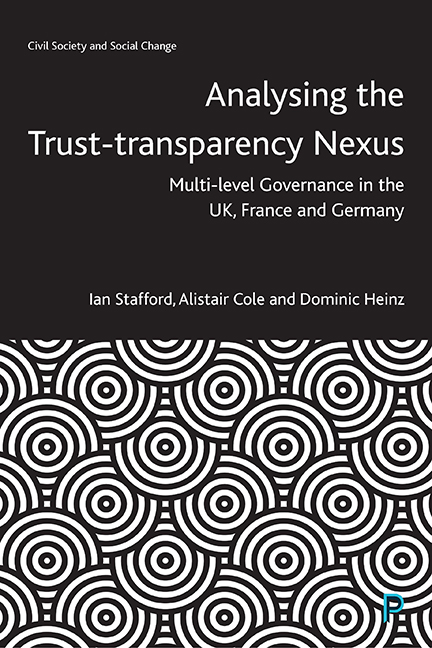Book contents
- Frontmatter
- Dedication
- Contents
- List of figures and tables
- List of abbreviations
- About the authors
- Acknowledgements
- Introduction
- 1 Building trust in an age of transparency
- 2 The trust–transparency nexus
- 3 Comparing cases
- 4 UK: North West England and Wales
- 5 Germany: Hesse and Saxony-Anhalt
- 6 France: Auvergne-Rhône-Alpes and Bretagne
- Conclusion: reflections on the trust–transparency nexus
- Appendix: qualitative fieldwork guide
- References
- Index
6 - France: Auvergne-Rhône-Alpes and Bretagne
Published online by Cambridge University Press: 15 September 2022
- Frontmatter
- Dedication
- Contents
- List of figures and tables
- List of abbreviations
- About the authors
- Acknowledgements
- Introduction
- 1 Building trust in an age of transparency
- 2 The trust–transparency nexus
- 3 Comparing cases
- 4 UK: North West England and Wales
- 5 Germany: Hesse and Saxony-Anhalt
- 6 France: Auvergne-Rhône-Alpes and Bretagne
- Conclusion: reflections on the trust–transparency nexus
- Appendix: qualitative fieldwork guide
- References
- Index
Summary
This chapter applies the trust– transparency matrix outlined in Chapter 2 to the case of France. It draws on a nationwide survey conducted in October 2016, as well as 38 interviews carried out in the two regions Auvergne-Rhône-Alpes and Bretagne from 2017 to 2018. The first section provides an overview of the received literature on trust and transparency, while the second presents cross-national survey findings that portray France as, in most cases, a critical case of mistrust. In the third section, we present findings of the nationwide survey conducted by YouGov, while the fourth section drills down into the interviews in the two regions. After a discussion of civil society, the chapter situates France in the overall context of the trust– transparency matrix and concludes by assessing the challenges that lie ahead in terms of rebuilding trust and role of transparency.
Exploring trust and transparency in France
France has often been deemed a low-trust society. Classical American, British and French scholars converged in the traditional reading of a divided French political culture pitting the ‘two Frances’ against each other, afraid of face-to-face contact and hiding behind impersonal rules (Crozier, 1963, 1970; Hoffmann, 1963; Hayward, 1973). Such representations have proved stubbornly persistent. This dyarchic culture has variously been diagnosed in terms of a revolutionary tradition, marked by conflict between church and state, between centre and periphery, between Paris and the provinces (Cole, 2017). Central authority has been contested throughout much of France's 200-plus years of post-revolutionary history. There is an undercurrent of political violence, whereby power is won in Paris. The fulcrum of mistrust occurred in the post-war Fourth Republic, which experienced 28 governments in 12 years of existence before succumbing to the colonial conflict in Algeria (Williams, 1964).
The first decade of the Fifth Republic confounded these prognostics. The founding decades of the Fifth Republic witnessed a restoration of trust in national political institutions; specifically, the institution of the French presidency (Ambler, 1975), after the chaos of the latter years of the Fourth Republic. The French presidency, directly elected since 1965, provided an incarnation of political authority (Andrews and Hoffmann, 1981; Wright, 1989) and still represents the key political office. The political modernisation represented by the Fifth Republic was accompanied by profound changes in French society and economy.
- Type
- Chapter
- Information
- Analysing the Trust-Transparency NexusMulti-level Governance in the UK, France and Germany, pp. 114 - 142Publisher: Bristol University PressPrint publication year: 2022



